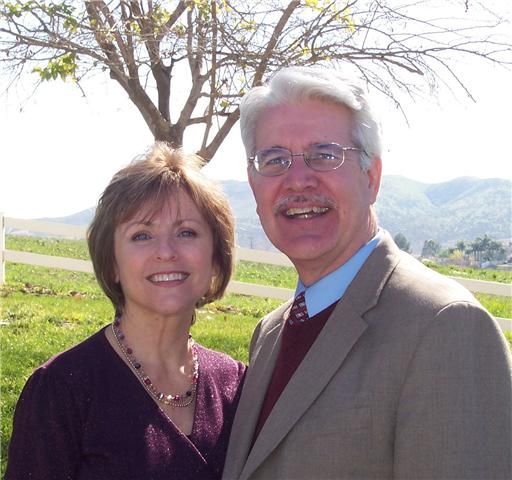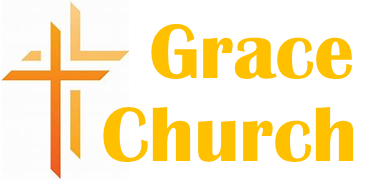About us

Welcome!
The current pastor is Bob Butler; his wife is Bonnie. They have three children and four grandchildren. They were both born and raised in California, Bonnie in Escondido and Bob in Whittier. They also grew up in church. Bonnie's dad was a pastor [founding pastor of Orange Glen Baptist in Escondido] and Bob's parents met at a Christian college [Asbury in Kentucky]. Both accepted Jesus into thier hearts at an early age.
Bob was a classics major at UC Irvine, a New Testament major at Talbot seminary, and earned a doctor's degree in education at California Coast University.
In addition to pastoral ministry, he has been involved with summer camping ministry, Christian education, and home schooling. He has been involved with the Friends Church, the Conservative Baptist, and the Evangelical Free Church. He has been at Grace since 2003.
He has also written a book entitled, God's Champion: the Life of Job.
A Brief History
Grace Church was established in 1980 as a home bible study in Canyon Lake. The bible study grew rapidly and asked Dan Seiker to be the first pastor in 1981. The church’s first meeting facilities were located on the second floor of a store front, where they met for several years. In 1984, the church affiliated with the Evangelical Free Churches of America. Dan Johnston was called as Pastor in 1985. In 1987 the church moved to the present I acre location, which now has three buildings. Dan continued as pastor until April 1995. Dan was well liked; however, one of his adult-children made some poor choices and he felt the need to resign. Doug Morgan was called as pastor in 1996 and was directed to a new ministry teaching in 1999. In December of 1999, the church called Eric Peterson to be their teaching pastor. He was young and energetic. He served the church until the spring of 2002 when he recognized that there was a fundamental philosophical mismatch. At that time, two members of the congregation stepped forward to serve in the capacity of pastoral leadership. Jim Orr became the pastor and Gary Stafford was the associate pastor. In part, this arrangement was made to help the financial condition of the church. Both held fulltime jobs in the field of education. In the spring of 2003, Bob Butler was called as pastor.
What We Believe - This is held by all Evangelical Free Churches
- We believe in one God, Creator of all things, holy, infinitely perfect, and eternally existing in a loving unity of three equally divine Persons: the Father, the Son and the Holy Spirit. Having limitless knowledge and sovereign power, God has graciously purposed from eternity to redeem a people for Himself and to make all things new for His own glory.
- We believe that God has spoken in the Scriptures, both Old and New Testaments, through the words of human authors. As the verbally inspired Word of God, the Bible is without error in the original writings, the complete revelation of His will for salvation, and the ultimate authority by which every realm of human knowledge and endeavor should be judged. Therefore, it is to be believed in all that it teaches, obeyed in all that it requires, and trusted in all that it promises.
- We believe that God created Adam and Eve in His image, but they sinned when tempted by Satan. In union with Adam, human beings are sinners by nature and by choice, alienated from God, and under His wrath. Only through God’s saving work in Jesus Christ can we be rescued, reconciled and renewed.
- We believe that Jesus Christ is God incarnate, fully God and fully man, one Person in two natures. Jesus—Israel's promised Messiah—was conceived through the Holy Spirit and born of the virgin Mary. He lived a sinless life, was crucified under Pontius Pilate, arose bodily from the dead, ascended into heaven and sits at the right hand of God the Father as our High Priest and Advocate.
- We believe that Jesus Christ, as our representative and substitute, shed His blood on the cross as the perfect, all-sufficient sacrifice for our sins. His atoning death and victorious resurrection constitute the only ground for salvation.
- We believe that the Holy Spirit, in all that He does, glorifies the Lord Jesus Christ. He convicts the world of its guilt. He regenerates sinners, and in Him they are baptized into union with Christ and adopted as heirs in the family of God. He also indwells, illuminates, guides, equips and empowers believers for Christ-like living and service.
- We believe that the true church comprises all who have been justified by God's grace through faith alone in Christ alone. They are united by the Holy Spirit in the body of Christ, of which He is the Head. The true church is manifest in local churches, whose membership should be composed only of believers. The Lord Jesus mandated two ordinances, baptism and the Lord’s Supper, which visibly and tangibly express the gospel. Though they are not the means of salvation, when celebrated by the church in genuine faith, these ordinances confirm and nourish the believer.
- We believe that God's justifying grace must not be separated from His sanctifying power and purpose. God commands us to love Him supremely and others sacrificially, and to live out our faith with care for one another, compassion toward the poor and justice for the oppressed. With God’s Word, the Spirit’s power, and fervent prayer in Christ’s name, we are to combat the spiritual forces of evil. In obedience to Christ’s commission, we are to make disciples among all people, always bearing witness to the gospel in word and deed.
- We believe in the personal, bodily and premillennial return of our Lord Jesus Christ. The coming of Christ, at a time known only to God, demands constant expectancy and, as our blessed hope, motivates the believer to godly living, sacrificial service and energetic mission.
- We believe that God commands everyone everywhere to believe the gospel by turning to Him in repentance and receiving the Lord Jesus Christ. We believe that God will raise the dead bodily and judge the world, assigning the unbeliever to condemnation and eternal conscious punishment and the believer to eternal blessedness and joy with the Lord in the new heaven and the new earth, to the praise of His glorious grace. Amen.
Distinctives of the Evangelical Free Church
1. The Evangelical Free Church of America is inclusive not exclusive.
The great heritage of the Evangelical Free Church people around the world includes the fact that fellowship and ministry opportunities in the local church are based solely on one’s personal faith in Jesus Christ as Savior and Lord, trusting in Him alone for salvation. Membership requires commitment to sound doctrine as expressed in our Statement of Faith. However, a person is not excluded from membership because he or she does not agree on every fine point of doctrine. Within the Evangelical Free Church, there is allowance for legitimate differences of understanding in some areas of doctrine.
2. The Evangelical Free Church is evangelical but not separatist.
The Evangelical Free Church was born out of a heritage of commitment to the authority and inerrancy of Scripture. We have deep convictions based on the authority of God’s Word, but we do not draw battle lines over minor points. Nor do we make minor issues of doctrine a test of fellowship in the local church. We are evangelical. We believe in separated living and personal holiness. But we are not separatist.
3. The Evangelical Free Church of America is ecumenical in spirit though not in structure.
We believe in the spiritual unity of the church, though not necessarily in structural union. We join with other Christians and other denominations of like precious faith in common goals and ministries to accomplish the Great Commandment and the Great Commission. But we believe that there is strength in diversity and that it is important to preserve our distinctiveness. We recognize that union in structure does not guarantee unity of spirit. Our foremost concern is unity of spirit with our Lord, with each other and with other Christians.
4. The Evangelical Free Church of America believes in liberty with responsibility and accountability.
We believe in Christian liberty, but freedom always has its limitations. Responsible Christians do not abuse freedom. The Apostle Paul wrote forcefully about Christian liberty in the book of Galatians. He shattered the legalists with the doctrine of grace. But in First and Second Corinthians and Romans, the apostle also rebuked believers when liberty was abused. He declared boldly the principles of Christian liberty but spoke with equal forcefulness about Christian accountability. The Evangelical Free Church desires to preserve our freedom in Christ and encourage our people to be responsible, godly men, women and young people who desire to live under the control of the Holy Spirit, in obedience to the principals and precepts of God’s Word and in harmony with God’s will for life as revealed in the Scriptures.
5.
The Evangelical Free Church of America believes in both the rational and relational dimensions of Christianity.
We believe the Scriptures must be applied to our individual lives with warmth of heart, warmth of message and warmth of concern. We believe it is essential to have solid biblical content in our doctrinal understanding of faith, but it is equally important to have a dynamic, vital relationship with God the Father through Jesus Christ the Son and to live by the power of the Holy Spirit. Sound Christian doctrine must be coupled with dynamic Christian experience. Ours is a ministry of love and reconciliation.
6. The Evangelical Free Church of America affirms the right of each local church to govern its own affairs.
The Evangelical Free Church is committed to a congregational form of government as stated in Article 10 of our Confession of Faith: “We believe that Jesus Christ is Lord and Head of the Church and that every local church has the right, under Christ, to decide and govern its own affairs.”
Strong pastoral leadership coupled with discerning and well‑equipped Christian lay people can produce spiritual growth as well as significant church growth. The New Testament emphasizes the importance of the Body of Christ ministering through the spiritual gifts that have been given to each believer. “Congregational in government’ means that each local church governs its own affairs. Within the local church, the highest human authority rests in the congregation.
Open Invitation
We welcome all to join us on Sunday morning and all who love Jesus to be a part of our community of believers.
Useful Links
Contact info
(951) 244-6444
gracechurchmenifee@outlook.com
P.O. Box 2098
Menifee, CA 92586
Created and Hosted with BUILD by One Eleven





